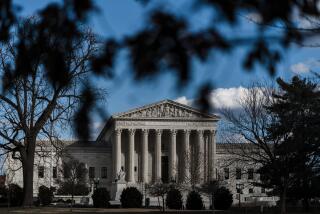Pacific Mutual Damage Appeal Will Be Argued Today : Litigation: Some expect the U.S. Supreme Court case to affect the size of punitive awards that can be assessed against corporations.
- Share via
In what some attorneys believe is a test case on the limits of punitive damages that can be assessed against corporations, the U.S. Supreme Court will hear oral arguments today in a lawsuit involving Newport Beach-based Pacific Mutual Life Insurance Co.
The case pits Pacific Mutual, the nation’s 27th largest life insurer with $8.6 billion in assets, against Cleopatra Haslip, a former employee of Roosevelt City, a poor, mostly black suburb of Birmingham, Ala.
The facts are simple: Haslip, now 59, had been a librarian and assistant city clerk for Roosevelt, which has since been annexed by its larger neighbor. In 1981, the town took out a combined life and health insurance policy for its employees through a Pacific Mutual agent.
Haslip, who paid $105 a month for life and health insurance premiums and took home $6,500 a year, was hospitalized with a kidney infection in 1982. She then learned that her employer’s policy had been canceled, even though it had been paying premiums. It turned out that the agent had been pocketing the payments.
The hospital demanded that Haslip pay a $3,500 bill. She said the incident wiped out her savings and ruined her credit. She and three other employees who were stuck with unpaid hospital bills sued Pacific Mutual, which said it was unaware of the agent’s duplicity. A jury awarded Haslip and the others $1.1 million, most of it in punitive damages.
Pacific Mutual has appealed. And the case has become the latest standard bearer for businesses and other deep-pocket defendants that are fed up with huge punitive damage awards that they believe make no sense and bear no relation to the injuries of plaintiffs.
They note, for instance, that the Haslip verdict is about 200 times the amount of medical expenses proved in court.
Pacific Mutual, whose attorneys could not be reached Tuesday, claims that it was denied due process guaranteed by the 14th Amendment because jurors had no standards to follow in assessing punitive damages, which are designed mainly to punish defendants for gross misconduct.
“The high court simply wants to decide the constitutionality of punitive damages,” conceded Bruce Ennis, Haslip’s appellate attorney.
Ennis doesn’t think that the Haslip case is the right one to use to set a precedent, and the Supreme Court could well sidestep the issue, as it has in the past. The court could wait to address the punitive-damages issue with other cases waiting in the wings.
Neither side, however, is taking any chances--especially since the court has put a hold on other, similar appeals until this one is resolved.
Two dozen trade groups from various industries have filed friend-of-the-court briefs on behalf of Pacific Mutual, arguing in essence that irate jurors cannot simply award any amount of money they want to punish defendants, but must base such decisions on some criteria.
Seven friend-of-the-court briefs filed on behalf of Haslip and her one-time co-workers argue two points. Groups such as Consumers Union contend that punitive damages are necessary to protect people and their environment and to punish egregious behavior.
And state attorneys general in California and other states argue that the Supreme Court should not meddle in the affairs of states, where well-settled law on punitives damages predates the 14th Amendment and was not altered by that 1868 constitutional provision.
“What the lawyers for Pacific Mutual are really complaining about is that they lost at the trial level,” Ennis said. “What’s unfortunate is that such an important question is being brought to the Supreme Court on such bad facts.”
More to Read
Inside the business of entertainment
The Wide Shot brings you news, analysis and insights on everything from streaming wars to production — and what it all means for the future.
You may occasionally receive promotional content from the Los Angeles Times.










